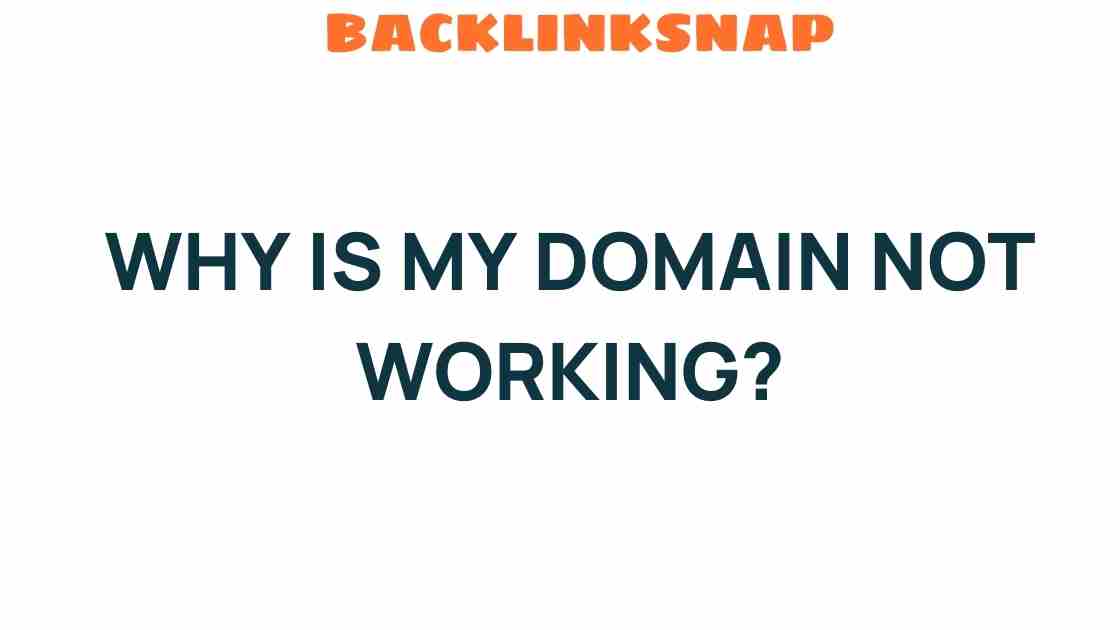Why Is My Domain Not Working? Unraveling the Mystery Behind Domain Issues
Experiencing website downtime can be a frustrating event for anyone, from casual bloggers to established businesses. When your domain isn’t working, it raises a multitude of questions. Is it a DNS problem? A hosting error? Or perhaps an issue with domain registration? In this article, we’ll explore the various reasons behind domain issues and provide insights into troubleshooting steps you can take to resolve them efficiently.
Understanding Domain Issues
Domain issues can stem from several factors, and understanding these can help you pinpoint the problem more effectively. Below are some common culprits:
- DNS Problems: The Domain Name System (DNS) is essentially the phonebook of the internet. If there’s a misconfiguration or delay in DNS propagation, your domain might not resolve correctly.
- Hosting Errors: If your website is hosted on a server that’s down or misconfigured, your domain will not be able to serve content to visitors.
- Domain Registration Issues: Failing to renew your domain or issues during the registration process can lead to downtime.
- Server Configuration: Inadequate server settings can prevent your website from loading properly.
- Internet Connectivity: Sometimes, the issue might not be with your domain at all, but rather with the user’s internet connection.
- Web Accessibility: Accessibility issues can also arise from a lack of compliance with web standards.
Common Signs of Domain Issues
Identifying the signs of domain problems is the first step in troubleshooting. Here are some common indications:
- Your website shows a “404 Not Found” error.
- It takes too long to load or times out completely.
- You receive a “Server Not Found” message.
- The site appears as completely blank.
- Your website works on some networks but not others, indicating a potential DNS issue.
Step-by-Step Troubleshooting Guide
Now that we’ve identified potential issues, let’s delve into troubleshooting steps you can take to get your website back up and running.
1. Check Domain Status
Start by checking if your domain is still active. You can use domain lookup tools like WHOIS to verify its registration status. If the domain is expired, you’ll need to renew it promptly.
2. Verify DNS Settings
If your domain is active, the next step is to check the DNS records. You can use tools like DNS Checker to see if your DNS records are properly configured. Make sure that:
- The A record points to the correct server IP.
- The CNAME records are correctly set up.
- There are no lingering old records that could be causing conflicts.
3. Inspect Hosting Status
Log into your hosting account to check for any server outages or maintenance notifications. Hosting providers often have status pages to inform users of any ongoing issues. If your server is down, contacting support may be your best option.
4. Test Internet Connectivity
Sometimes the problem lies with your internet connection. Try accessing your website from different devices and networks. If your site works elsewhere but not on your local network, your ISP might be the issue.
5. Review Server Configuration
Inadequate server configurations can lead to downtime. Ensure that your web server (like Apache or Nginx) is set up correctly. Check for issues in your .htaccess file or other configuration files that might be causing access problems.
6. Seek Professional Help
If you’ve followed the steps above and your domain is still not working, consider reaching out to a web professional. They can conduct a thorough analysis and help identify more complex issues.
Preventing Future Domain Issues
Once you’ve resolved your current problem, it’s wise to take preventative measures to avoid future domain issues:
- Regularly Check Domain Registration: Keep an eye on your domain’s expiration date and set reminders for renewal.
- Monitor DNS Records: Use monitoring tools that notify you when DNS changes occur.
- Backup Your Website: Regular backups ensure that you can restore your website quickly in case of a failure.
- Choose Reliable Hosting: Invest in a reputable hosting provider with strong uptime guarantees.
FAQs About Domain Issues
1. What are the common DNS problems that can cause downtime?
Common DNS problems include misconfigured records, DNS propagation delays, and expired DNS records.
2. How can I check if my domain is registered?
You can use WHOIS lookup services to check the registration status of your domain.
3. What should I do if my hosting provider is down?
If your hosting provider is down, check their status page and reach out to their support for updates.
4. Can I fix DNS issues myself?
Yes, many DNS issues can be resolved by adjusting records in your domain registrar’s control panel.
5. How often should I check my website for downtime?
It’s advisable to monitor your website regularly, ideally using automated tools that can alert you to downtime instantly.
6. What is the best way to back up my website?
Use a combination of manual backups and automated backup solutions provided by your hosting service or third-party tools.
Conclusion
Experiencing domain issues can be stressful, but understanding the underlying causes can empower you to troubleshoot effectively. Whether it’s DNS problems, hosting errors, or connectivity issues, taking a systematic approach to diagnosing and resolving these problems will help ensure your website remains accessible to your audience. By implementing regular checks and preventative measures, you can mitigate the risk of future downtime and maintain a seamless online presence.
For more information on web accessibility and ensuring your site is always up, consider checking out W3C’s Web Accessibility Initiative.
This article is in the category Website Performance and created by BacklinkSnap Team




